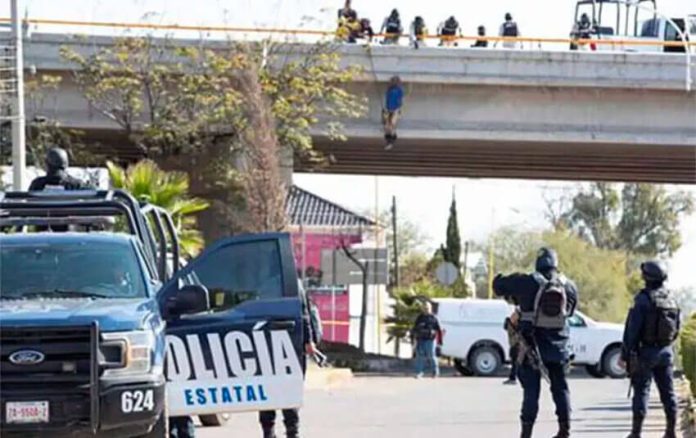Sixteen police officers have been killed in Zacatecas in the first quarter of 2022, another grim reminder of the soaring violence in Mexico’s central state.
For the last 11 days, police across the state have been engaged in a general strike, demanding fired colleagues be reinstated, for better pay and healthcare, as well as deploring dangerous security conditions.
On March 26, an off-duty officer of the Metropolitan Police was killed while driving through Fresnillo, Zacatecas. Armed civilians blocked the road and fired more than 20 bullets at his vehicle, after which they lit it on fire.
A few weeks before, another officer had been shot just meters away from the police station, and several others were killed in private or public vehicles earlier in the year.
According to the register of police killings by Causa en Común, Zacatecas is the state with the highest number of such killings in 2022 so far, having risen steadily from third position in 2021, and 13th in 2020.
Zacatecas’ police force was already in dire straits. María de la Luz Domínguez Campos, president of the Human Rights Commission of the state, says that according to the U.N. recommendations on the ratio of police officers to inhabitants, the state has a deficit of over 3,000 officers. In November 2021, there were at least five municipalities that had no police officers at all.
This crisis in policing comes as wider violence in Zacatecas is also on the rise. According to figures released by the Executive Secretariat of the National Public Security System, homicides in the state increased by 143% between 2020 and 2021, from 789 to 1,134, making Zacatecas the state with the highest homicide rates in Mexico. In response, the government launched Operation Zacatecas II in November 2021, sending 3,848 troops to the state in an effort to keep order.
InSight Crime analysis
This wave of police killings can best be understood in light of the ongoing turf war ravaging Zacatecas and the state’s inability to protect its forces.
Zacatecas is a battleground for the Sinaloa Cartel and the Jalisco New Generation Cartel and smaller groups with whom each have formed alliances. The state is vital to these cartels because of its strategic location along drug trafficking routes to the United States.
Amid the rise in violence resulting from this war, which intensified in 2021, police officers have been unable to adequately protect themselves. According to Mexican gun laws, officers are not allowed to carry arms when off duty. This makes them easy targets once they leave work.
Furthermore, very few arrests have been made in relation to these killings, reflecting the broader issue of impunity afflicting Mexico, and Zacatecas in particular. In 2020, the percentage of crimes that were either not denounced or not investigated was 93% nationally, and 95% in Zacatecas.
Gustavo Aguilar, the mayor of Loreto, one of Zacatecas’ municipalities without a single police officer, explained that he had no force because since the murder of their colleagues the security agents had been too afraid. On March 19, a group of Zacatecas police officers went on strike, accusing senior officers of abuse of power and harassment, and demanding financial support for the families of victims. On the same day, at least 20 officers left their positions because they felt threatened.
Reprinted from InSight Crime. Vera Sistermans is a writer with InSight Crime, a foundation dedicated to the study of organized crime.
